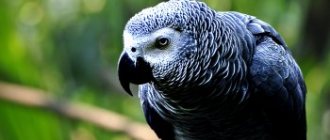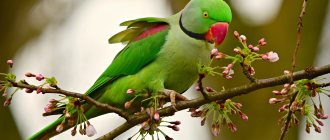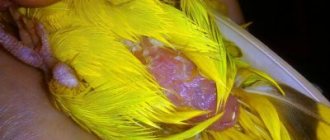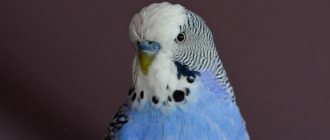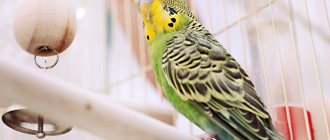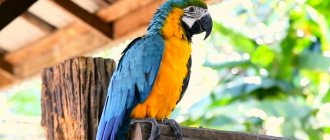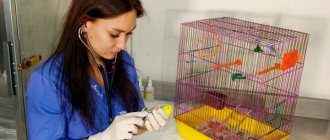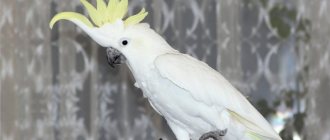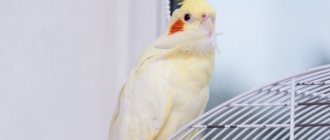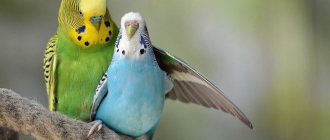Like any other pet, a parrot needs a clean drink and balanced, fresh food every day.
Regardless of how often and in what doses parrots eat, the digestive system of such birds is very sensitive to change.
Because of this, experts recommend not leaving parrots for a long period of time without the care of their owners, as well as without food and drink.
Many owners of ornamental birds are concerned with the question of how long they can go without water and food and how many days they can leave it unattended.
- How long can a parrot live without water?
- How long can a parrot live without food?
How long can a parrot live on average without food?
Birds have a fast metabolism. In this regard, they eat food in small portions, but often. The digestive process does not last long and the nutrients in the feed are quickly absorbed. In small birds, the intestines are empty within an hour after the stomach is filled.
Such an intense metabolism is associated with the lifestyle of this group of warm-blooded animals. Birds' bodies are adapted to flight. During flight, a large amount of energy is expended, which the bird must be able to quickly replenish. The energy from the feed is used to maintain the contractility of skeletal muscles and cardiac muscle. In addition, a lot of energy is required to maintain a constant body temperature. It has been established that in small birds at low ambient temperatures up to 2/3 of the energy received from food is spent on maintaining body temperature.
Birds living in domestic conditions spend less energy than their wild relatives, but their metabolism still remains fast, so they also need regular nutrition. As a rule, a bird eats a full feeder in a day, so you need to pour food into it every day. It has been established that a parrot can live without food for no more than 4 days. However, this statement only applies to healthy, well-nourished individuals. Weakened, sick, young or old birds can die from hunger already on the second day. Keeping them at low ambient temperatures also shortens the lifespan of a hungry parrot.
How to save a parrot if starvation cannot be avoided
If you still cannot avoid starvation, it is important to find out how long the parrot could go without food. If 48 hours or more have passed without food, the first thing to do is take your parrot to a warm place and start feeding him small amounts of soft food at regular intervals. Most likely, the bird will refuse to eat and drink, so you will have to force it.
But the method of feeding a parrot with a spoon or syringe is ineffective. There is a chance that the pet will remain hungry and even tormented by fear. Therefore, experts advise not to be afraid and try to feed him with a catheter. In this way, you will saturate the bird’s body with nutrients that it has been deprived of for some time.
To do this, a butterfly catheter No. 19-20 is inserted into the lower part of the crop (in adult parrots - about 4 cm). If it is not inserted deep enough, food may enter the respiratory tract or esophagus. The thickness of the trachea is much smaller than the esophagus, so it is almost impossible to get into it with a catheter - there is nothing to be afraid of. After this, you can start feeding.
If the animal is very weak, instead of food and water, it can be given an injection of 0.6 ml of 5% glucose. It should be mixed with 0.4 ml of Ringer's solution or saline. This amount of liquid should be administered in small portions throughout the day through a catheter or pipette. It can also be poured into a drinking bowl.
But the best thing to do is take your bird to the vet!
How long on average can a parrot live without water?
Being the main solvent, water is necessary for all living beings, even more than food. It removes toxic metabolic products from the body and maintains the volume of circulating blood at a constant level. Without water, it is impossible to absorb nutrients from food and carry out metabolism.
On a note! Birds drink frequently, so clean water should always be freely available. Feeding dry food, as well as keeping it at high ambient temperatures, increases water consumption.
A parrot can live without water for no more than 2 days. At the beginning of the third, as a rule, the bird dies from dehydration. Young, old, sick and weakened birds can die within the first day without water. If the bird in the cage has succulent food (fruits, vegetables), this can extend its lifespan, but consumption of dry food (grain mixture), on the contrary, will shorten it.
How to Avoid Dehydration
To prevent this from happening:
If dehydration occurs:
The occupant of the cage should always be able to go into the shade. If there is no lamp, you can warm it with a heating pad. In the latter case, care should be taken to ensure that the animal does not get burned. Heating supports metabolic processes in birds and has a regenerating effect. But if suddenly the parrot begins to spread its wings and beak, breathing heavily, heating should be stopped immediately.
How long can a budgie live without food and water?
The smaller the size of the bird, the faster the metabolism occurs in its body. Since the budgerigar is a small parrot, its metabolism is higher than that of large species. In this regard, its needs for food and water are also high.
When leaving for a few days, the owners are interested in how long a budgerigar can live without food and water and whether it is possible to leave the feathered pet unattended for this time. Normally, a budgie comes to the water bowl and feeder several times a day. These small birds live no more than two days without water, and no more than 3 days without food. If the parrot is sick, weakened, or kept in a cold or too hot room, its lifespan without food and water will be shortened. Chicks and old individuals are more susceptible to thirst and hunger than adults and healthy ones.
What to do if fasting does occur
In this case, you should immediately try to feed the bird. This should be done with finely chopped pieces of food, preferably in a warm place. Often hungry birds refuse to eat and have to be force-fed. To do this, a catheter is inserted into the goiter of a sick bird to a depth of approximately 4 centimeters.
If the device is inserted deeper, food may enter the airways, which can lead to further complications.
When the parrot is very weak, the situation can be saved by 5% glucose in a 0.6 milliliter injection. It should be mixed with saline or Ringer's solution. The fluid should be administered in small portions several times a day. Use a catheter or pipette for this procedure. The resulting liquid can also be poured into a parrot's drinking bowl.
Comments (17)
06/02/2020 at 16:02 | #
And I read that budgerigars live up to 20 years, and in the wild they live for 3 years.
06/07/2020 at 13:46 | #
Yes, indeed: budgerigars in captivity can live 20 years, but this is very rare. They more often die due to the carelessness of their owners than due to old age, so few of the wavy ones even reach their 15th birthday, let alone 20. But in nature, ornithologists do not keep a strict record of the entire population; they periodically catch several individuals and, thanks to this, an approximate range of longevity of “savages” has appeared. The fact that most priests, unfortunately, die young is no secret to anyone.
08/04/2020 at 03:01 | #
Our parrot lived for 14 years. From 1994 to 2021. Now here’s a new handsome guy, in the prime of his life, from the same year, 2020) that’s 9 years... That’s the first one, that this one – he talks, be healthy, excellently)) In silence – he’s silent! In the dark - sleeping! Many say that they were just lucky with the choice... who knows... but it’s just a miracle, not a parrot!) Both the first and the current one. ) I advise everyone. Care, in fact, is minimal, but the positive from this bird is maximum and even more!)) PS Two cats became friends with the bird at one moment, now they simply don’t pay attention to him, we call it friendship))) And he, in his turn, he often shouts “scat”, because cats were often raised with him and he learned this word in one moment)) But from his lips it doesn’t sound so terrifying, so the cats don’t pay much attention to it either!))) Guys, I recommend it.
Nina Polet
11/18/2020 at 09:23 pm | #
I, too, everyone who is not afraid of work, and caring for a parrot is also work, should have this beauty. Mine always hides in my hair, loves me very much. When I come home from work, he screams like a police whistle.
09.14.2020 at 23:21 | #
My parrot is already 17 years old! It is a great joy that he lives for so long and I hope he will live long enough! Acts like he's young! You can’t say at all that he’s already such a long-liver with us)
09/15/2020 at 08:31 | #
Do you have a budgie? It’s wonderful when our pets’ lives are not a fleeting moment. To a large extent, the parrot owes this longevity to you, your care and attitude towards it. Of course, innate immunity is an important factor (who the parents are, what kind of health they have), but this is only a small part, and in general it is your merit).
12/17/2020 at 09:15 | #
Mine is 23 years old, looks perfect, I don’t really worry about his health. I haven’t been sick at all, I eat regular food very often, it always flies into my plate when I eat. Loves cheese popcorn. It feels like it's going to outlive me...
12/26/2020 at 03:28 | #
Super! let him live! health to you and the parrot
03/27/2020 at 08:46 | #
You are lucky that the bird has such a strong body, but this does not mean that you need to feed it from your table. Still, try to keep the parrot’s diet as close as possible to the bird’s normal diet; you can imitate your lunch, leave a salad on the table in a plate, mash porridge just for him without adding salt, etc., and pretend that it’s yours menu. It is clear that it is very difficult to wean a bird at this age from bad habits, which, moreover, were encouraged (although I don’t know the type of your parrot, maybe it’s a macaw and 23 years old is a teenager for him)), so you can just use it's for his benefit)
03/18/2020 at 09:35 | #
Hello, our first parrot lived for 10 years, but died due to our fault, he caught a cold in a draft. We didn’t know, they are VERY afraid of drafts, whoever gets a pet should definitely remember this! The second one is now eight years old, he also speaks and loves to eat our food from the plate. They also feel very loved and cared for.
03/27/2020 at 08:47 | #
Hello, the food from our table is very dangerous for parrots! This is a game of roulette.
03/23/2020 at 09:03 | #
20 years, nightmare!! They will definitely outlive me, these parasites! If it had been up to me, they wouldn’t have set foot in the house. The owner adores them, but they are afraid of him. They don’t live in a cage - “oh, poor little birds need to fly”, they fly everywhere, shit everywhere, they throw food everywhere too. But the main thing is they yell. You can’t put him in a cage or shut him up! The sound is disgusting!! If only I could tweet quietly and peacefully.. To put the child to bed - Total Pain!! If you have a separate room for this, or your child likes to fall asleep to this heavenly singing, or you like it when everyone in the house is screaming and not sleeping - it’s up to you. Before the child - it was impossible to sit quietly in front of them, talk, or watch a movie - these creatures immediately begin to babble louder than you. I hate it. I'm waiting for them to die. Now, it became clear that I was waiting in vain.
03/27/2020 at 09:00 | #
Hello, the fact that birds live outside the cage will significantly shorten their life. It doesn't seem like the owner loves them if he puts the birds in danger every day and makes you suffer. Yes, birds are very noisy creatures by nature, so in order for them not to cause discomfort to the rest of the family, it is important to create conditions. I can advise you to do something for them, which in turn can make your life easier: 1) Birds are on a permanent run and are left to their own devices, so they are looking for entertainment. You should concentrate their attention in one corner of the room; it is better to sacrifice a square meter than to give up the entire living space to be torn to pieces. What is needed for this: you need to build a playground for them. I don’t know the type and number of parrots you have, so I leave it to you to decide what the size of the area should be. The Internet is full of homemade ones and you can get a lot of ideas, the easiest way is to bring a branchy fruit branch (not from a dangerous tree, scald it with boiling water first), maybe two, fasten them opposite each other, hang them with all kinds of bells, beads, lids, ropes, cardboard (toilet bags) paper will do), in short, all sorts of rustling, shiny and rattling things. Believe me, the parrots will not be able to resist. If the platform is on the window or nearby, then this means even more bird happiness and even less droppings in the rest of the apartment. 2) Birds should ONLY eat inside the cage. Any food should only be there. 3) Accustomed birds fly to sleep in a cage, they perceive it as a home, as protection and they feel calmer in it. If your little devils also behave this way, then teach them that you cover the cage in the evening before going to bed, and in the morning you open it and let it out.
We recommend reading: Lifespan of a Pet Budgerigar
06.06.2020 at 19:38 | #
If you hate feathered pets so much, don’t suffer! Give them to someone. You’re also making yourself miserable and the bird too. look. Mine is already 8 years old. And the children sleep peacefully with her, and she is friends with the cat. And you live quietly alone. Do the world a favor - give a bird to someone, make someone happy. Maybe your psychosis will go away. And insult You can’t be defenseless, they can’t answer you. I was ashamed to read your nonsense
06/02/2020 at 19:53 | #
My male is 10 years old! The female is 7 years old. Moreover, she breeds once a year! What 5 years are you talking about? As far as I know, all birds live more than 10 years. Mine still behaves like a chick and has no intention of dying.
06/02/2020 at 20:48 | #
Inga, the article says that parrots live from 5 to 15 years. It is very good that your bird lives in such conditions that the age of 10 is invisible to it, but believe me, this does not mean that all parrots live to that age. 5 years are those birds that did not die a natural death: they were stepped on, pinned by doors, fed something from a human table, inhaled fumes in the kitchen, flew away, were poisoned by a house plant, etc., you can list a lot of accidents and deaths parrots caused by negligence or irresponsibility of the owners. And, unfortunately, statistics show that this happens to our pets much more often.
06/20/2020 at 10:29 | #
Our girl died today. She lived for 8 years. Yesterday evening she behaved quite unusually. She walked on the floor and tables (usually sits in a cage. On the chandeliers). Of course, there is damage for 8 years (the walls are torn off. The chandeliers are crap. The frames are chewed into rubbish). .I even wanted to give it to someone. But the child didn’t give it to me. And today it’s gone. And I’m so sorry. Who will fly?! Tweet?! Sad... I don’t know if I should start it now or if it’s not worth it anymore?! This parrot lived the longest. As a child, they lived with me for no more than a year.
In the homeland of parrots, in flocks of parakeets, epidemics break out, the cause of which is not fully understood by scientists due to the fact that each time the culprits are different natural disasters or a combination of circumstances.
The effect of daily alcohol consumption on the body
Alcohol-containing products tend to cause cravings, which are very difficult to overcome in the future. The composition contains many harmful impurities that have a detrimental effect on the entire body. Gradually, tissues and cells of almost all systems are destroyed.
Ethyl alcohol, when used systematically, causes both physiological and social damage. The consequences manifest themselves in the form of serious damage to all body systems and the development of chronic diseases.
Physiological changes
When ethanol gets inside, it interacts with nervous tissue: its protection is destroyed. Just 1 liter of beer or a bottle of wine leads to serious consequences - the death of up to 10 thousand brain cells that cannot be restored. This subsequently affects mental activity and general health.
Ethyl alcohol also disrupts the conduction of impulses through nerve cells. For the central nervous system this manifests itself as:
- problems in the emotional sphere;
- the appearance of speech defects;
- disturbances in the functioning of the organs of vision and hearing;
- problems with coordination, etc.
Alcohol has an effect on the cardiovascular system. The tissues of organs are connective tissue, the elasticity of which is lower. This affects the functioning of the heart and blood vessels: problems with blood pressure appear, and there is a violation of the contractile function of the myocardium.
The whole body suffers, there are no exceptions. Ethyl alcohol harms the walls of the stomach, so the risk of ulcer formation is high. There is a change in acidity, which also negatively affects the digestion process.
Frequent dizziness and headaches are also a common consequence of alcoholism.
External signs of a drinking person
The visual manifestations of a drunkard do not immediately become noticeable. Signs begin to develop gradually. With each subsequent stage of development of the disease, the marks on the face of an alcoholic become more and more pronounced. Most of them are reflected in appearance:
- due to improper outflow of bile, the whites of the eyes and skin become yellow;
- the face turns red as blood pressure rapidly rises after drinking alcohol;
- the skin becomes covered with pimples and rashes;
- The area under the eyes suffers - so-called bags are formed, spoiling the appearance.
Dry epidermis and accelerated appearance of wrinkles are also signs of people who drink. Often the face is covered with a thin vascular network.
The nose takes on a burgundy-red hue. Much changes in facial expressions: the muscles of the mouth relax excessively, the forehead tenses. As a result: the face takes on a rather strange expression, as if always slightly surprised.
People who drink lose weight and their skin looks unhealthy. In this case, swelling of the face is characteristic. These are the signs that will help you recognize a drunkard at first sight.
Mental changes
Long-term use of ethanol-containing drinks is fraught with significant mental disorders. There is a high risk of developing alcoholic hallucinosis. Often patients hear voices that insult them, say unpleasant things, and are often threatening in nature.
The most common disorder is delirium, otherwise known as delirium tremens. With hallucinosis there is no impairment of consciousness. The patient continues to navigate in time. In some patients, the disease becomes chronic.
Personality degradation is a fairly common accompaniment of addiction. Intellectual abilities and stress resistance are significantly reduced. The drinker is secretive and taciturn. An ever-increasing dose of alcohol negatively affects the ability to adequately perceive reality. In the morning, the patient does not remember what happened the day before while he was aggressive or unconscious.
Impact on family relationships
An alcohol abuser destroys both his life and his family. Alcoholism is not compatible with family life. For the patient, the environment becomes an obstacle on the path to addiction. The social role of a person is changing dramatically, as is psychology. Close people suffer, as the person becomes weak-willed and aggressive. The wife of an alcoholic and his children have to endure a lot. The drinker stops fulfilling his family responsibilities and brings a lot of trouble to his loved ones. Inappropriate actions, changeability in mood, hostility - this does not have the best effect on relationships between people. The rudeness and irritability of an alcoholic primarily affects those closest to him - his wife and children. The progression of the disease further complicates the situation. This often leads to discord within the family and subsequent divorce.
The well-being of children is at risk. They grow up in an unhealthy environment, which affects their psyche. All the patient's immediate circle suffers from binge drinking. Female alcoholism is no less dangerous. A sick woman is not able to fully perform the functions of a mother. The disease destroys women's nature. Long-term alcohol abuse is fraught with serious changes in the psyche. This is especially dangerous for children and their health.
Psychosis and hysteria become constant companions of an alcoholic. Another problem is codependency. The suffering felt by family members is a direct consequence of the drinker’s actions. The well-being of others deteriorates in proportion to the increase in the dose consumed by the patient. Everyone is stressed: spouse, children.
How to prevent dehydration in your parrot
Even if you do not plan to leave your pet alone, you need to monitor its drinking regime. The main condition is water quality. It must be water of suitable quality, still or filtered. In places of low quality - cooked. This can be tap water or well water. Not too hot and not too cold.
Water can be poured into special drinking bowls and changed daily. Do not forget to check the drinking bowl - dirt or food may get into the tube, and the parrot will not be able to quench its thirst.
If you are unsure whether a bird is using a waterer, mark them daily and monitor the water level. If it does not change, replace the drinker with an open container, but replace the water at least 3-4 times a day. Parrots are very afraid of infection and can get sick if they drink dirty water.
A feathered friend is more than just a chirp and a bell
The owner should realize what responsibility rests on his shoulders - after all, a bird will live nearby for decades, requiring attention, care and love.
You will have to deal not only with games and fun, it is quite possible that from time to time you will have to eliminate the consequences of the pranks of mischievous people: a discarded or nibbled flower (well, if not dangerous for the bird), peeled wallpaper, constant and ubiquitous husks from grains and pieces of fruit on the walls .
Also, for years, it will be necessary to carry out daily hygiene procedures for the cage, monitor the condition of the toys and the walking area, the quality of the food and, if necessary, carry out a course of treatment and prevention during the parrot’s illness.
Behind a beautiful picture of a bright and energetic bird in a cage in your home, your daily work and care will be hidden.
